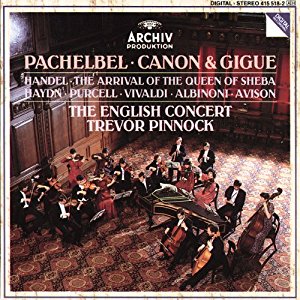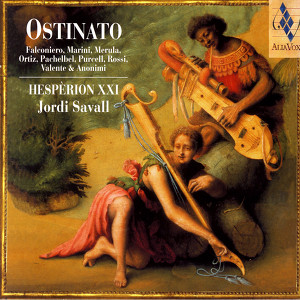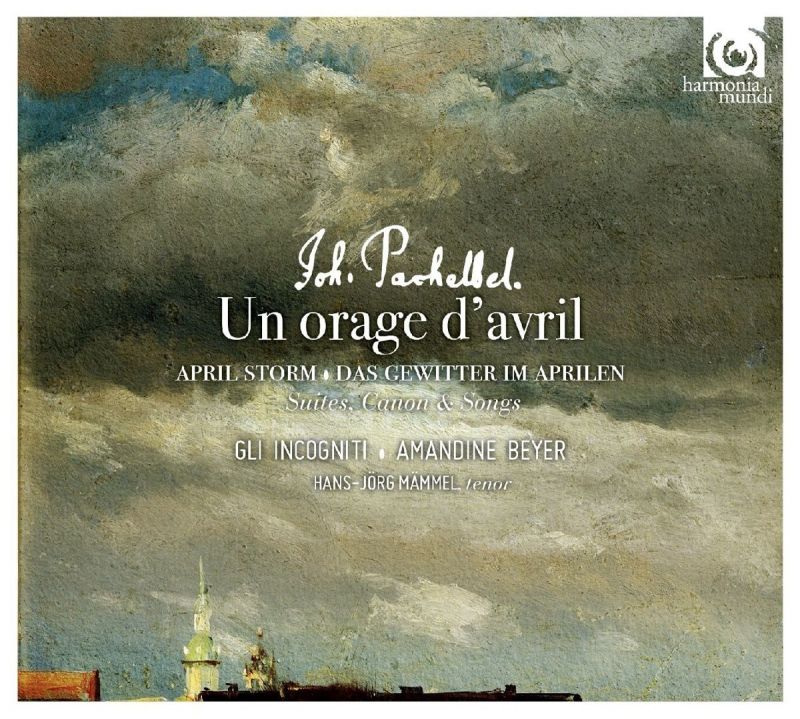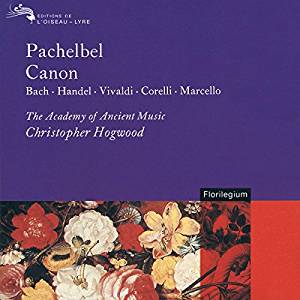Pachelbel's Canon and Gigue – a quick guide to the best recordings
Gramophone
Thursday, February 16, 2017
A quick overview of the best versions of that wedding-ceremony favourite, Pachelbel's Canon

Canon and Gigue, etc
The English Concert / Trevor Pinnock hpd
Archiv
What this release – with the Pachelbel Canon, gracefully played, as its obvious draw – certainly creates is a brightly lit shop window for The English Concert’s approach to music of the 17th and 18th centuries. Handel’s orchestral symphony, the Arrival of the Queen of Sheba, is crisp, vigorous and as exciting and colourful as it was clearly intended to be. The same applies to the sparkling Vivaldi Sinfonia. The most interesting items in the programme, though, are the concertos by Haydn, Albinoni and Avison – in that order. Trevor Pinnock himself is the soloist in the Haydn Concerto in D major (the one with the Hungarian rondo finale). Haydn may well have had a piano in mind for the solo instrument but Pinnock’s harpsichord-playing is authoritative and convincing. David Reichenberg is the soloist in Albinoni’s Concerto in D minor, Op 9 No 2: it’s one of the composer’s finest concertos. The Avison Concerto is one from a set of 12 which he based on keyboard sonatas by Domenico Scarlatti. The music at times will be unfamiliar to most listeners, even those well up in their Scarlatti, since the two slow movements relate to unidentified sonatas. Much to enjoy, and it should have a wide appeal.

'Ostinato'
Hespèrion XXI / Jordi Savall
Alia Vox
Hespèrion XXI recreate the improvisatory world of instrumental music of the 16th and 17th centuries. Repeated bass or harmonic patterns – the basso ostinato – are the linking factor while each composer from Ortiz to Purcell displays amazing skill at combining the restriction of harmonic repetition with freedom of inventiveness‚ discipline stimulating creativity with brilliant result. The same is true of this recording: the players’ disciplined virtuosity brings out the improvisatory background of much of this music in a dazzling display that enthralls the listener. Despite the constant of the ostinato‚ the variety in texture and instrumental colour in the pieces selected is such that there is never a dull moment: Jordi Savall on viols ranging from bass to treble is completely at one with the music of Diego Ortiz – never have I heard it more convincingly performed – while the violin playing of Manfredo Kraemer and Pablo Valetti in the later trio sonata-based pieces is full of rhythmic vitality and interest. The continuo team‚ mostly plucked strings in the earlier repertory and keyboard (harpsichord or organ) with theorbo in the later works‚ is superb: inventive and as virtuoso as the soloists they accompany.

Canon and Gigue, etc
Gli Incogniti / Amandine Beyer
Harmonia Mundi
The title of this release and the glowering skyscape on its cover are pure marketing – the piece from which the title comes is not about April weather at all – but I don’t think anyone lured by it into buying a disc of 17th-century chamber music need feel aggrieved. We don’t get enough reminders that Pachelbel was a real composer of quality chamber music, yet here is his complete Musikalische Ergötzung of 1695, consisting of six ‘Parthien’ (or suites) for two violins and continuo. Add in a seventh, unpublished suite, six secular songs and the Canon and Gigue, and these are ‘musical pleasures’ indeed.
If April is a red herring, the presence elsewhere in the artwork of Brueghel is more apt, for Pachelbel’s music has a strong sense of connection with the world. The songs deal feelingly with death, the perfidy of princes (that’s the April showers one), ‘Good Councillor Walther’ and a nameless patron, while the suites, for all their restless counterpoint, never lose touch with their grounded choreographic roots. Fine music, then, but not rarefied.
In Gli Incogniti it finds itself in expert hands. There is depth and sweetness to their sound, clarity and busyness to their counterpoint, and buoyancy to their expression of rhythm and line. They are as able to inhabit serious melancholy (in Partie IV for instance) as to access a sense of fun for dances such as the Aria of the ‘Partie a 4’ (to which they add a rat-a-tat finger-on-wood accompaniment) or in the occasional playful burst of pizzicato. Likewise, in the unassumingly strophic songs, they can quickly summon a mood, most movingly when viola-comforted death is the subject; Hans Jörg Mammel’s clear but plangent tenor helps, though I wish he had more ease of movement. The Canon is intelligently done, its slowly changing countenance subtly observed, and closing not in grandiose climax but gentle farewell. Less chiselled than London Baroque’s muscly 1994 recording, and more in tune than that of Les Cyclopes (7/95), this release is well worth your time.

Canon and Fugue
The Academy of Ancient Music / Christopher Hogwood
Decca L'Oiseau Lyre
A 'lollipops' record from Hogwood? Yes, but with a difference: he has had the good idea of pre senting all these favourite items in their original form, on period instruments at the right pitch and in the right proportions, played in the right style and at the right tempos. Stripped of spurious reorchestrations and misguided 'improvements' they emerge, as one might have hoped, fresh and clean; and after hearing them only perverse diehards, surely, would go back to the inflated, over-coloured and heavily varnished versions usually heard.











